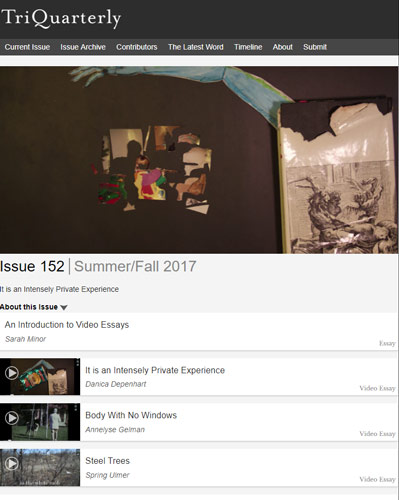TriQuarterly – Summer/Fall 2017
TriQuarterly’s Summer/Fall 2017 issue is rife with writing of a high literary caliber. The pieces in this issue are all exciting in their own way, and I found myself quite taken by a number of them. Many of the fiction pieces in this issue are stellar. Though the stories range in style from straight-up literary realism to magical realism with a touch of the surreal, the one thing they share in common is a strong emotional core.
TriQuarterly’s Summer/Fall 2017 issue is rife with writing of a high literary caliber. The pieces in this issue are all exciting in their own way, and I found myself quite taken by a number of them. Many of the fiction pieces in this issue are stellar. Though the stories range in style from straight-up literary realism to magical realism with a touch of the surreal, the one thing they share in common is a strong emotional core.
Kerry Neville’s “The Assassin of Bucharest” centers on a father-son relationship and how that develops over the course of weeks. Powell is on a Fulbright scholarship teaching English at a university in Bucharest, Romania, and has brought his son Henry along with him. Henry still doesn’t know how to process the loss of Beth, his mother, and Powell does his best to assuage his son’s grief.
A sense of place is well-conveyed in the story; strong descriptive language abounds. Powell and Henry are both physically and emotionally dislocated in this environment. A line that stuck with me came when the son asks his dad about the mother’s death, and the dad reflects: “Powell had done everything he could. He loved his wife, and she loved him, but her illness had no regard for love.” This story portrays the difficulty in moving on from loss with much grace.
Another story that does a winning job of capturing a sense of place is “False Fronts” by Ezra Carlsen. The story vividly details the journey of Ida as she travels to Los Algodones to seek affordable dental care after a vicious assault several months prior left her with half her teeth missing. Ida eventually meets Rocio Solis, a dentist who agrees to help her out. As the story unfolds, there’s a good bit of tension in the way Ida questions if she’s making the right decision and whether or not Solis is who she says she is, but the story is ultimately one of human connection, filled with fully-realized characters and plenty of pathos.
While the two stories mentioned above are great examples of literary realism, I admit I’m a sucker for stories that stray from full-blown realism, and one such story is “Skin” by Miranda Schmidt. The story concerns a young boy whose mom happens to be a mythical-type of creature known as a selkie, a cold-water being that lives in the ocean and can sometimes turn human when they come onto land. It’s an extremely compelling story of a young boy trying to find his place in a world that he doesn’t really understand. It’s a story about what it feels like to be an outsider, about wanting to belong.
One scene in particular captures the feelings of alienation associated with being socially isolated when the protagonist wants to play “knights and ladies” with the other kids. As the young boy tries on a piece of makeshift armor, the other kids start asking him about his mother; they bombard him with questions and borderline taunts, asking if she casts spells on sailors out at sea:
“How would she spell them?” he asked, trying to imagine his mother in a wizard’s hat and cloak, brandishing a magic wand at a ship full of sailors, all the while feeling the wood digging into his stomach, feeling the twine netting tighten around him.
This scene, and the protagonist’s response, are an emotional gut-punch to me. Memories of being picked on in school came back to me; I could feel the kid’s pain, which Schmidt captures so well here. This is a great story that takes what, at times, can seem like a familiar topic and does something fresh with it. Along with the wonderfully inventive “Kong’s Dream” by Michelle Ross, “Skin” is probably my favorite story of the bunch.
The current issue also boasts a variety of intriguing poetry that ranges in form from the impactful, halting rhythms of Cate Lycurgus’s fragmented “Litany for Permission,” to the straightforward yet intense language of Kim Young’s prose poem “Civilian.” Much of the poetry here is compelling and many sound fantastic. Each poem is accompanied by an audio recording of it at the top of the page. Readers get to catch all the nuances of the language, the rhythm and the sound, as they can follow along with the audio. For the general reader who is not fully accustomed to reading or encountering poetry, this is a feature of the journal to explore. This is such a good idea because poems are, essentially, meant to be listened to, which only enriches the experience.
There’s more than enough in the Summer/Fall 2017 issue of TriQuarterly to keep readers entertained, beguiled, and moved for a long while.
[www.triquarterly.org]






